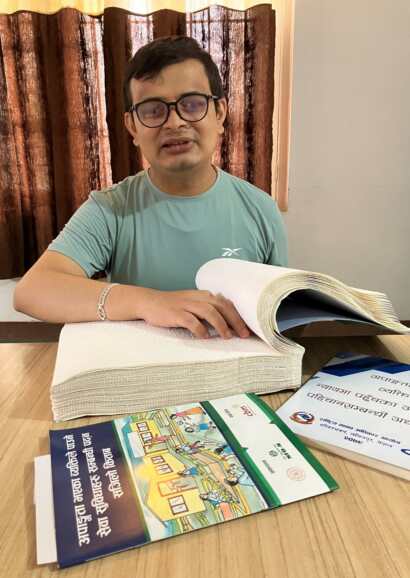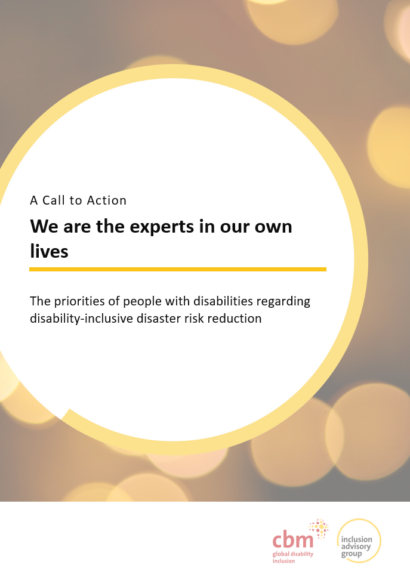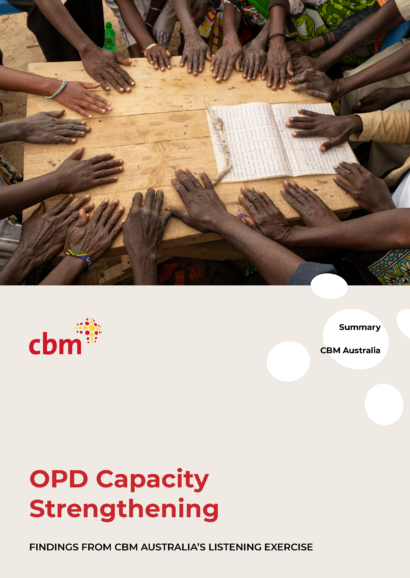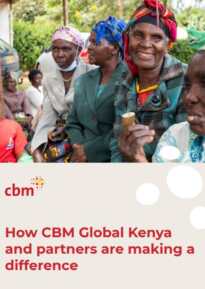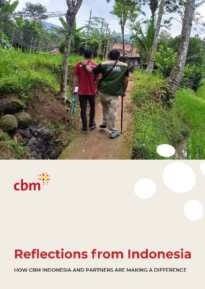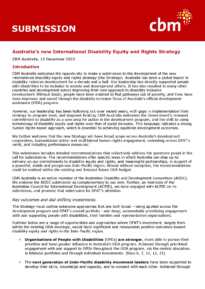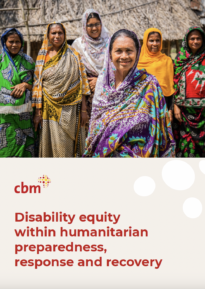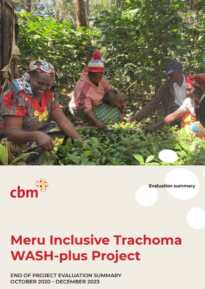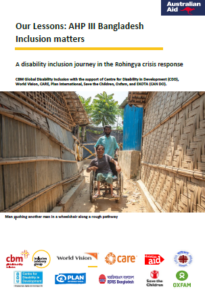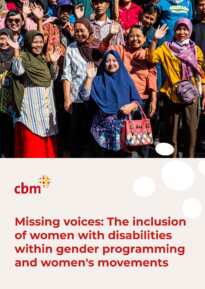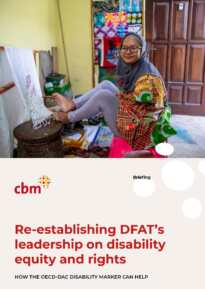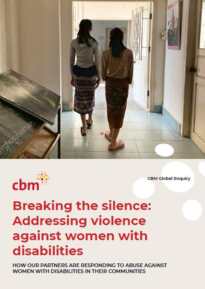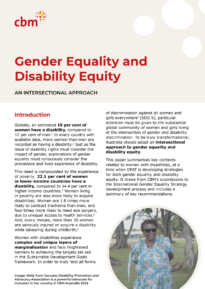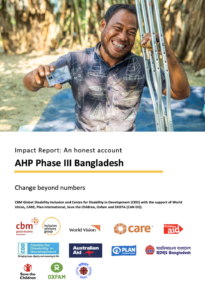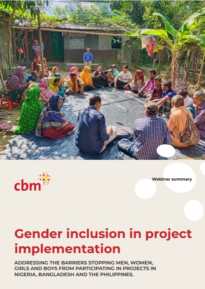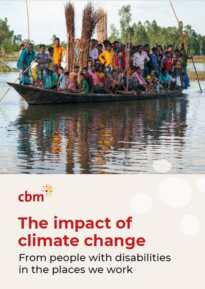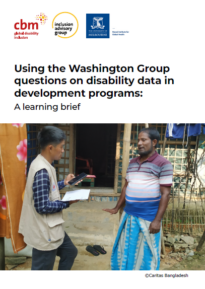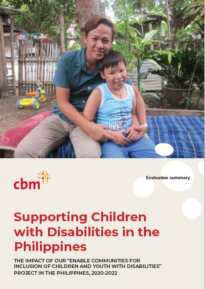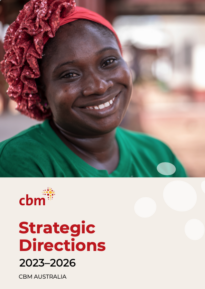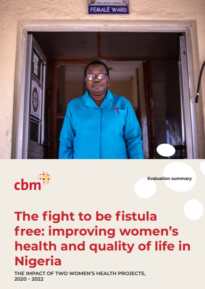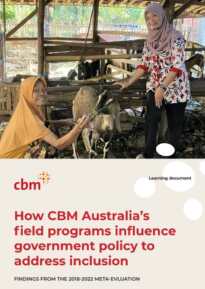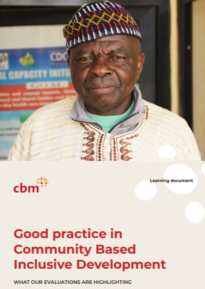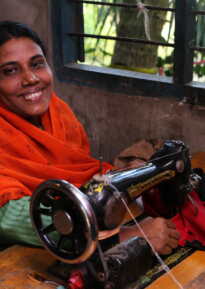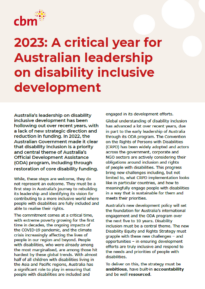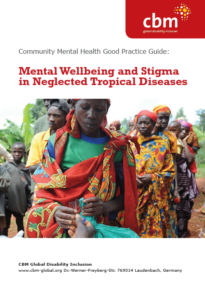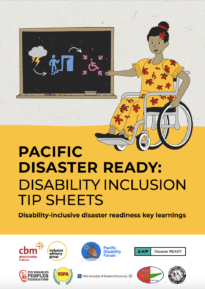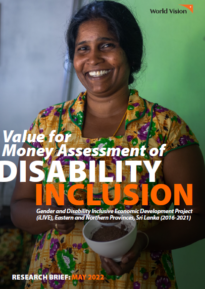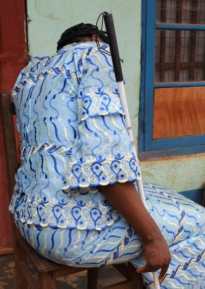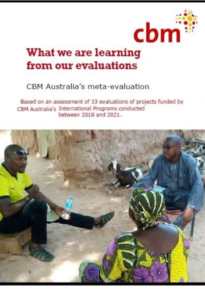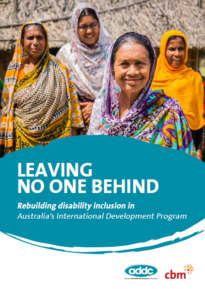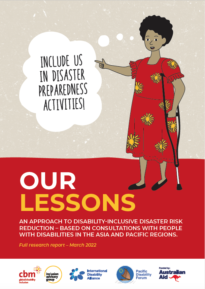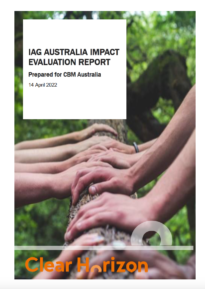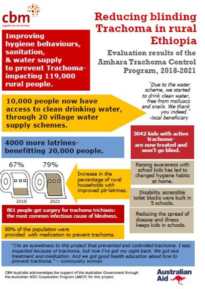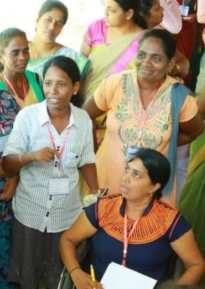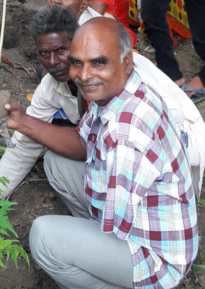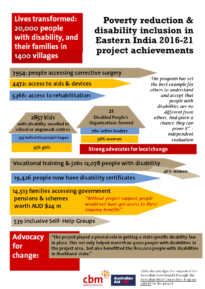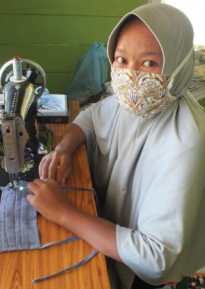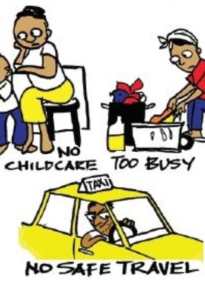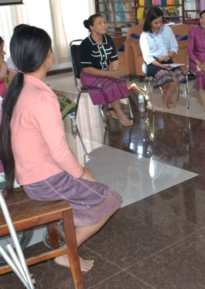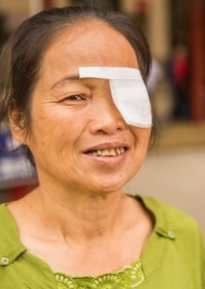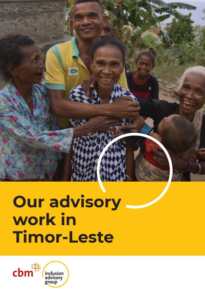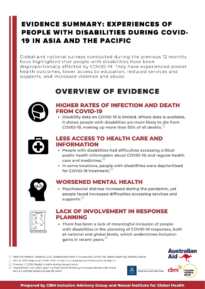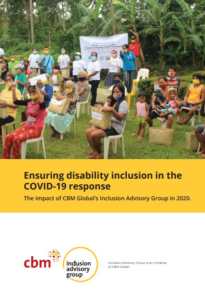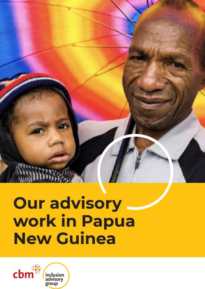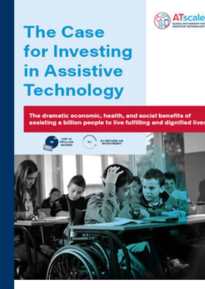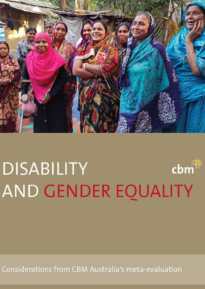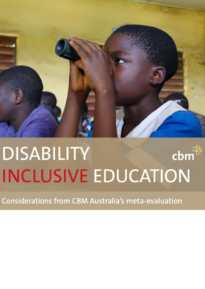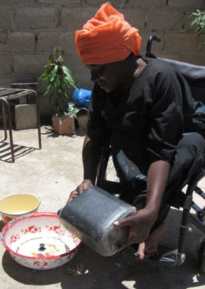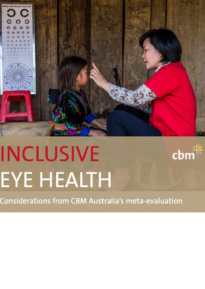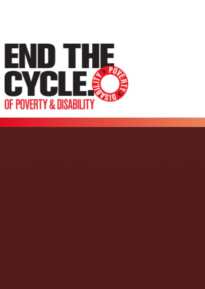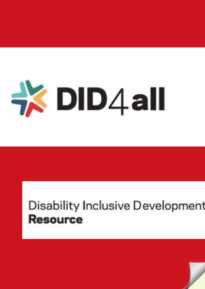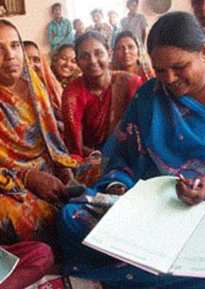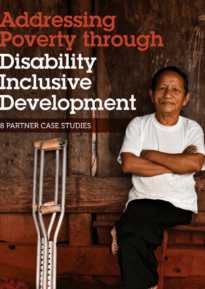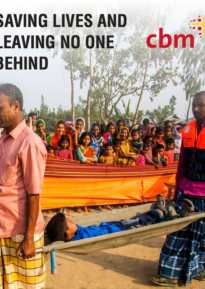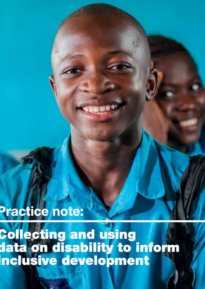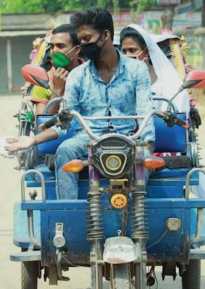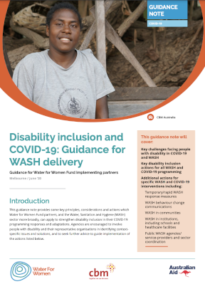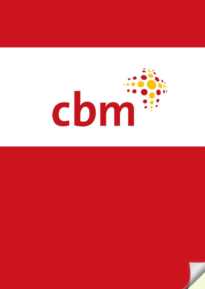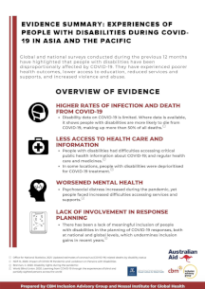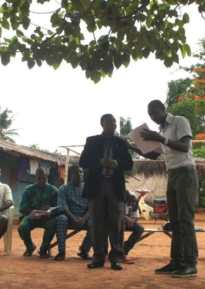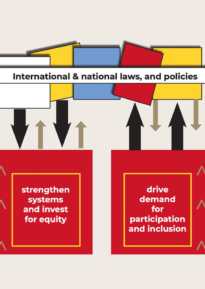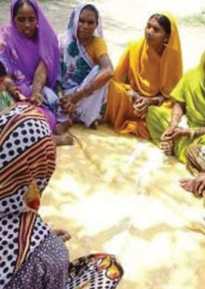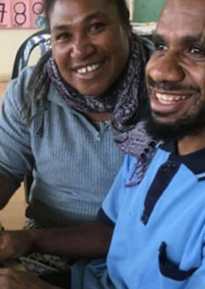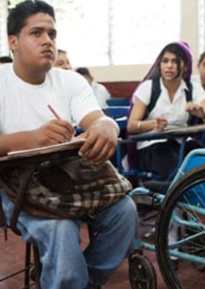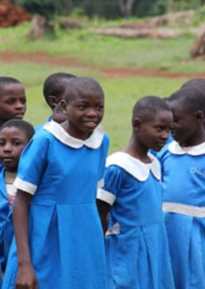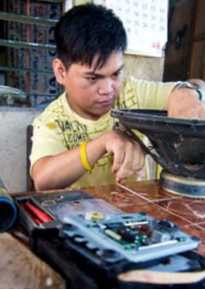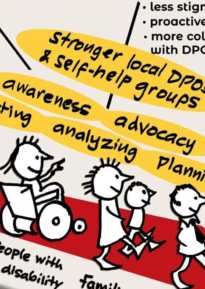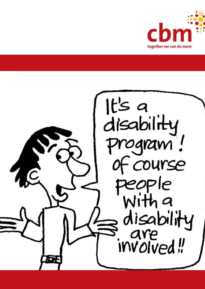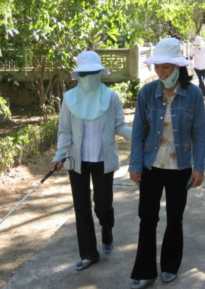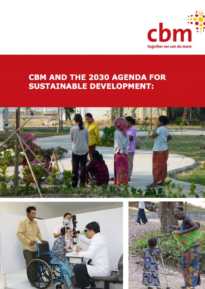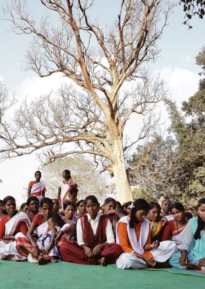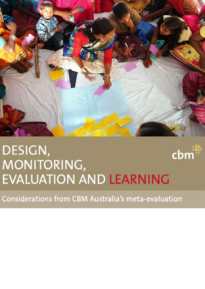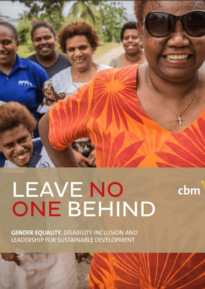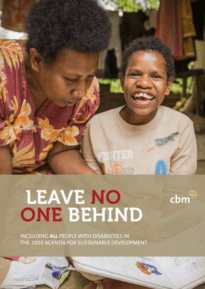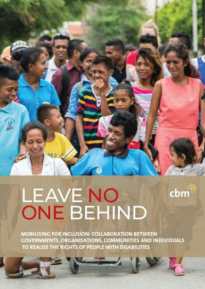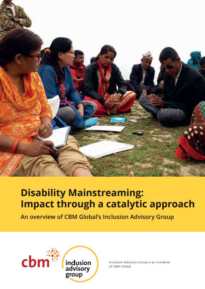Browse our resources to discover more about our approach, learning and the impact of our work.
Looking for our Annual Report or Financial Statements? Visit our Publications & Reports page.
Sustainability Enquiry Aceh Mental Health
From 2006 to 2021, CBM Australia transformed mental health care in Aceh, Indonesia, post-Tsunami, through a rights-based approach integrating medical and social support. This "Aceh model" shifted from institutional care to sustainable, holistic care involving families and communities, reducing stigma and improving accessibility. As part of CBM Global’s Sustainability Enquiry, this document examines the long-term impact of our work and the factors influencing its sustainability. While challenges remain, the lasting effects include reduced stigma, greater awareness of the social-medical approach, and ongoing community engagement in mental health care.
Include Us advocacy project in Nepal
Learn how the Include Us advocacy project in Nepal, led by NFDN, has contributed to improved disability inclusion, from policy development to better access to services.
Disability-Inclusive Disaster Risk Reduction Call to Action: We are the experts in our own lives
This Call to Action centres the voices and priorities of people with lived experience of disability, based on their experiences working in disaster risk reduction (DRR) across the Asia and Pacific regions.
OPD Capacity Strengthening: Findings from CBM Australia’s listening exercise
This document summarises key learnings from those in CBM Global working closely with and seeking feedback from OPDs. These help us refine our approach as we consider commitments we made in ‘We have a key role now’.
Evidence summary: Disability Data and Eye Health
In 2023, The Fred Hollows Foundation (The Foundation) engaged CBM Global's Inclusion Advisory Group (IAG) to gather evidence and provide practical recommendations on collecting and using disability data within eye health programs. Although there were well-established tools and guidance on disability data within population surveys and development programs, clear guidance on their application and rollout in the eye health sector was unavailable.
Kenya Impact Report
CBM Global Kenya works across the country to support people with or at risk of Disability. They work closely with the African Inland Church Health Ministries (AICHM) and the Diocese of Meru - Service for the Poor in Adaptive Rehabilitation Kinship (DOM-SPARK). This report shares stories and reflections from those working on the Meru Inclusive Trachoma Wash-Plus (MINT) project and the OPD LEAD project.
Indonesian Impact Report
CBM Indonesia works across the country to support people with disabilities. This report looks at five projects and documents the stories and reflections from those working on the projects. It looks at: -Our advisory work in Indonesia -The ACEH CBID project -A Community Mental Health project -I-See - an Inclusive Eye Health project -The People Centred Inclusive Humanitarian Action project
CBM Australia’s International Disability Equity and Rights Strategy submission
CBM Australia's submission to the development of Australia's new international disability equity and rights strategy.
Disability equity within humanitarian preparedness response and recovery
This briefing paper explores the context around disability inclusion in different elements of humanitarian action and provides recommendations and case studies of CBM Australia’s programming.
Meru Inclusive Trachoma WASH-plus Project
CBM Australia supported the Meru Inclusive Trachoma WASH-plus project, a three-year project that aimed to break trachoma transmission patters and improve community health, sanitation, and livelihoods for people, including people with disabilities, in Meru, Kenya. This document highlights the key achievements of the project, as well as broader flow on impacts.
AHP III Bangladesh: A disability inclusion journey in the Rohingya crisis
This report documents achievements and lessons learned and presents recommendations to progress disability inclusion further in the Rohingya response and for the humanitarian sector at large.
Missing voices: Inclusion of women with disabilities in gender programming and women’s movements
This paper identifies good practice in the involvement of women with disabilities in mainstream gender programming, as well as women’s movements, within the Indo-Pacific region.
Re-establishing DFAT’s leadership on disability equity and rights
This briefing explores a tool that can support DFAT to achieve the aim to be a strong and consistent advocate for disability equity and rights.
Breaking the silence: Addressing violence against women with disabilities
This document explores how CBM Global implementing partners, including OPDs, are responding to issues of gender-based violence in the communities in which they work, including what is working well and where more support is needed.
Gender Equality and Disability Equity: An intersectional approach
This paper summarises key contexts related to women with disabilities, at a time when DFAT is developing strategies for both gender equality and disability equity. It draws from CBM’s submissions to the International Gender Equality Strategy development process and includes a summary of key recommendations.
AHP Phase III Bangladesh Impact Report: An honest account
This report seeks to reflect the lived experience of people with disabilities in the Rohingya AHP Phase III Response, their stories and feedback on what has changed for them, and the continued barriers they face.
Gender Inclusion In Project Implementation
CBM Australia and partners in Bangladesh, Nigeria and the Philippines recently held a webinar looking at what has stopped men, women, girls, and boys from participating in project activities, and what they have done to address this. These are some of the key things we learned.
The Impact of Climate Change
This document captures the perspectives of people with disabilities who have been affected by climate change in the countries we work, and documents how CBM Global is responding.
Using the Washington Group questions on disability data in development programs: A learning brief
Consolidating the lessons and experiences of development organisations in collecting and using disability data, with a focus on the question sets developed by the Washington Group on Disability Statistics.
Supporting Children with Disabilities in the Philippines
The impact of our “Enable Communities for Inclusion of Children and Youth with Disabilities” project in the Philippines over three years.
Strategic Directions 2023-2026
CBM Australia's Strategic Directions 2023-2026 is a three-year plan working towards our vision of an inclusive world in which all people with disabilities enjoy their human rights and achieve their full potential.
Nigeria Women’s Health Projects Evaluation
Evaluation summary highlighting the impact of the work of CBM and our partners in reducing obstetric fistula in Nigeria, by training healthcare workers, increasing community awareness and improving medical facilities and resources.
How CBM Australia’s field programs influence government policy to address inclusion
CBM Australia recently looked across 33 of our project evaluations from 11 countries and assessed the degree to which projects have led to changes in government policy or action, including local, national, or institutional.
Good practice in Community Based Inclusive Development
CBM Australia recently looked back at evaluations of our international programs over the last four years. These are some of the common learnings around good practice when working with people with disabilities in CBID programs.
What recent evaluations are telling us about our work in livelihoods
CBM Australia recently looked at evaluations of our CBID work over the last five years. While many evaluations highlighted big transformations in people’s lives because of livelihoods support, overall, the outcomes were mixed.
2023: A critical year for Australian leadership on disability inclusive development
As extreme poverty grows for the first time in decades, fuelled by both the worsening climate crisis and the COVID-19 pandemic...
Community Mental Health Good Practice Guides
Practical examples of how CBM is working with partners to mainstream mental health in Neglected Tropical Diseases (NTDs) programs, to reduce stigma improve mental wellbeing.
Pacific Disaster Ready: Disability inclusion tip sheets
The Pacific Disaster Ready Tip Sheets are a suite of documents and includes key messages and talking points for different sectoral and thematic issues drawing on the learnings from the past four and a half years of the Pacific Disaster Ready project.
Value for Money Assessment of Disability Inclusion
IAG worked with World Vision in Sri Lanka, and their research shows the value of investing in disability inclusion.
What’s stopping women with disabilities from reporting gender-based violence report
Research to better understand what stops women with disabilities in Cameroon from reporting incidents of sexual violence and domestic abuse, and recommendations about what development practitioners can do in responding more effectively.
What we are learning from our evaluations
We reviewed 33 evaluations of our international projects. These are some of the common themes and learnings about our effectiveness.
Rebuilding Disability Inclusion in Australia’s International Development Program
Includes a set of 11 important policy recommendations made by CBM Australia and Australia’s peak representative body on disability inclusion in the aid program, the Australian Disability and Development Consortium (ADDC).
Our Lessons: disability-inclusive disaster risk reduction report
An approach to disability-inclusive disaster risk reduction based on consultations with people with disabilities in the Asia and Pacific regions.
IAG Australia Impact Evaluation Report
An independent evaluation of the work of Australia’s Inclusion Advisory Group shows that the team effectively supports governments, multilaterals and NGOs to better address disability inclusion in their programs.
Reducing Trachoma in Ethiopia: Results
Results from the work of CBM and partners in reducing the prevalence of blinding trachoma - by improving water supply, hygiene and sanitation.
Lessons learned from partnerships with organisations of people with disabilities: CBM report
What do Organisations of People with Disability value about working with CBM? And where could we do better? How we are responding to work more equitably with the disability movement.
Study demonstrates people are better off
Since 2015, CBM Australia has tracked how the economic situation of people with disabilities and their families in rural India has changed, as a result of our Community Based Inclusive Development project. Here’s what we found.
Poverty Reduction and Disability Inclusion in Eastern India 2016-21
Over the past five years, CBM Australia have been supporting partners in Eastern India to implement the Poverty Reduction and Community Based Inclusive Development project.
CBM’s work in Indonesia: approaches and achievements
An overview of how CBM works in Indonesia- in supporting eye health, mental health, community based inclusive development and disability inclusive humanitarian responses.
Gender barriers: what stops women or men participating
These two cartoon posters outline some of the barriers that might stop women or men getting involved in development projects. For development practitioners.
Accessible meetings and events: a toolkit
Guidance on organising accessible and inclusive events and meetings in planning, delivery and follow-up stages.
Tip Sheets for considering gender issues in International Programs
CBM-Australia has launched a series of tip sheets aimed at our field partners and other development practitioners that prompt consideration of issues related to gender in our work. Take a look at our first two in an ongoing series of tip sheets: on gender and eye health, and gender on mental health, released in 2021.
Our advisory work in Timor-Leste
The catalytic impact of our advisory work in Timor-Leste: 12 case studies..
Evidence Summary: Experiences of People with Disabilities During COVID-19 in Asia and the Pacific
Global and national surveys have highlighted that people with disabilities have been disproportionally affected by COVID-19.
Inclusion Advisory Group: Impact Report 2020
This report gives an overview of the work of CBM Global's Inclusion Advisory Group in 2020, particularly in response to COVID-19.
Our Advisory work in PNG
A snapshot of how CBM Global’s Inclusion Advisory Group has worked in Papua New Guinea, and how it has influenced for disability inclusion.
Why action and investment are needed in assistive technology
While well over one billion people around the world require the use of at least one assistive technology, in low- and middle-income countries 90% do not have access to what they need.
Disability and Gender Equality
Learning from evaluations of our projects: 2015 to 2017.
Disability Inclusive Education: considerations from a meta-evaluation
What we learned from evaluations of our inclusive education projects: 2015-17.
Disability and WASH:
CBM provides advice on how to ensure that water, sanitation and hygiene programs are accessible to people with disability.
Inclusive Eye Health evaluations
What we learned from evaluations of our eye health projects: 2015 to 2017.
End the Cycle
Provides free and downloadable videos, factsheets and toolkits in which people with disability tell their own stories.
DID4All
Provides links to a wide range of resources on disability inclusive development, funded by the Australian Government and supported by CBM Australia.
Self help groups and disability inclusion
Guidance for project implementers.
Addressing Poverty through Disability Inclusive Development
8 Case Studies on the inclusion of people with disabilities and their families in development initiatives.
CBM’s approach to disability inclusive disaster risk reduction
Full report, summaries and infographics on the Gaibandha Model for disability-inclusive disaster risk reduction.
Collecting and using data on disability to inform inclusive development
Practical guidance on data collection approaches.
Making sure we do no harm
Learnings from our programs.
CBM Disability & Gender Toolkit
How organisations can assess their context and their approaches.
Disability inclusion and COVID-19: Guidance for WASH delivery
This guidance note provides some key principles, considerations and actions.
Mental Health and Health Crises: what the Ebola epidemic can teach us about mental health during pandemics?
What ebola taught us about mental health during pandemics
Experiences of people with disabilities during COVID-19
This overview was developed by CBM's Inclusion Advisory Group to guide the Australian Government and other aid donors on disability issues, as they responded to COVID-19 through aid programming.
Influencing government
How CBM and partners work with government.
CBID’s top down and bottom up approach
An infographic.
CBID in India
State-level NGOs support the development of local self-help groups and OPDs, that influences local government for inclusion.
CBID in Papua New Guinea
A national NGO collaborates with national government departments to deliver a similar model across the country.
CBID in Nicaragua
A three-way collaboration of government, NGO and OPDs is bringing brought a CBID approach to scale in a low resource setting.
CBID in Cameroon
A local NGO service provider is taking a community mobilisation approach with local government and organisations, in a resource poor setting with limited national government engagement.
CBID in the Philippines
NGOs and OPDs work in a context of decentralised government systems that have legal and budgetary support for disability.
What is CBID – an infographic
Participation for All
Approaches to ensure inclusion.
Organisational Engagement on Disability Inclusion tool
Is your NGO disability inclusive? A toolkit to help your organisation assess aspects of disability inclusion, and guidance on action planning.
Strengthening Environmental Sustainability and Inclusion in Health Programs
Disability, Gender and Unpaid Care Work
Recognising, valuing and redistributing unpaid care work in CBM’s programs.
Design, Monitoring, Evaluation and Learning
Learning from evaluations of our projects: 2015 to 2017.
A policy paper on gender, disability inclusion and women’s leadership
A policy paper on gender, disability inclusion and women’s leadership.
A policy paper on inclusion of people with different disabilities
A policy paper on inclusion of people with different disabilities.
Leave No One Behind
CBM’s Leave No One Behind series makes a case for disability inclusion in international development.
Disability Mainstreaming: Impact through a catalytic approach
“Disability Mainstreaming: Impact through a catalytic approach”, gives an overview of the work of our Australian team from 2014-19.


